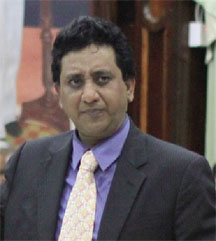Attorney General Anil Nandlall on Monday tabled the Anti-Money Laundering and Countering the Financing of Terrorism (Amendment) Bill 2013 specifically to meet FATF recommendations to address weaknesses in the Principal Act and related legislation.
The last FATF evaluation of Guyana, which is a member of the Caribbean FATF, found that while authorities have started to comply with some of its recommendations, the measures taken remained still minimal. Guyana’s failure to comply with the recommendations could affect foreign investment in the country.
Among other things, the bill seeks to widen the reach of the law by including concepts such as “beneficial ownership” (to identify persons who ultimately exercise ownership rights in legal entities) and widening definitions, such as the “proceeds of crime” (to include indirect gains), “property” (to include electronic or digital evidence) and “terrorist financing” (to include funds whether from a legal or illegal source).

But members of both APNU and AFC while saying that it was too early to analyse the amendments, noted that their intended purpose is simply to meet international obligations.
“I think it’s just done to satisfy the international agencies who are the drivers behind the Act,” said APNU’s Shadow Minister of Home Affairs Winston Felix.
“This is really to placate some concerns by a pressure group or something… You could tinker with the law. You could change it. You could amend it. You could spice it up, doll it up, the issue is not the law. It’s the political will to go after money launderers, to go after the criminal enterprise,” AFC’s Moses Nagamootoo added.
According to Felix, enforcement measures are needed “to give life” to the law. “There are so many indicators of money laundering that one wonders whether the infrastructure is in place to conduct the investigations and to give life to the Act. There is no escaping it around Georgetown. You can’t escape seeing indicators of money laundering activity, which should occasion some form of investigation,” he said.
Nagamootoo said that it isn’t enough to go after money criminals. “It’s a problem with setting up… We don’t have a Financial Intelligence Unit to speak of that has the facilities and the personnel to go after financial crimes and therefore if you don’t have an investigative arm, changing the law, amending the law, is not going to have the effectiveness” Nagamootoo said. “To date there has been no successful prosecution of anyone for money laundering… I am not too sure if is anyone has been prosecuted at all or that anyone has been investigated at all or that any contact person, that is, politically- or otherwise exposed people, who rub shoulders with the money launderers… But what we need to have is how do we define ourselves as a nation, determined to fight all types of crime,” he added.
According to the bill, the amendments propose to increase the minimum fine upon conviction for certain money laundering offences from $1 million to $5 million, the insertion of a new section to provide for the freezing of funds of terrorists and terrorist groups or organisations and widening the scope of the Financial Intelligence Unit (FIU) to request information from telecoms providers.
The amendments also seek to expand due diligence obligations of reporting entities. One of the amendments would provide for reporting entities not to open new accounts or conduct business when it is unable to obtain a satisfactory evidence of the identity of the intended customer and to consider making a suspicious transaction report. And, where a customer becomes “politically exposed”—either directly as a functionary of the government, state, judiciary, military, important political party, or indirectly as a family member or close associate of such a functionary—the senior management of a reporting entity would have to green-light continued business relations.
The bill also makes provisions for amendments to the Gambling Prevention Act; the Mutual Assistance in Criminal Matters Act; the Securities Industries Act; the Money Transfer Agencies Licencing Act; the Foreign Exchange (Miscellaneous Provisions Act); the Co-operatives Societies Act; the Companies Act; and the Insurance Act.
President Donald Ramotar, last week at the opening of a Financial Crimes Stakeholders’ Workshop, co-sponsored by the United States, the United Kingdom, Canada and the European Union (EU) missions, pledged support to “follow the money to see where it goes. Our actions are not only because we want to meet our international commitment and our international treaty obligations but it’s also important for the moral life in our society—fighting against these corruptions that these things bring about.”
FATF is an inter-governmental body that has sought to set standards and promote effective implementation of legal, regulatory and operational measures for combating money laundering, terrorist financing and other related threats to the integrity of the international financial system.





